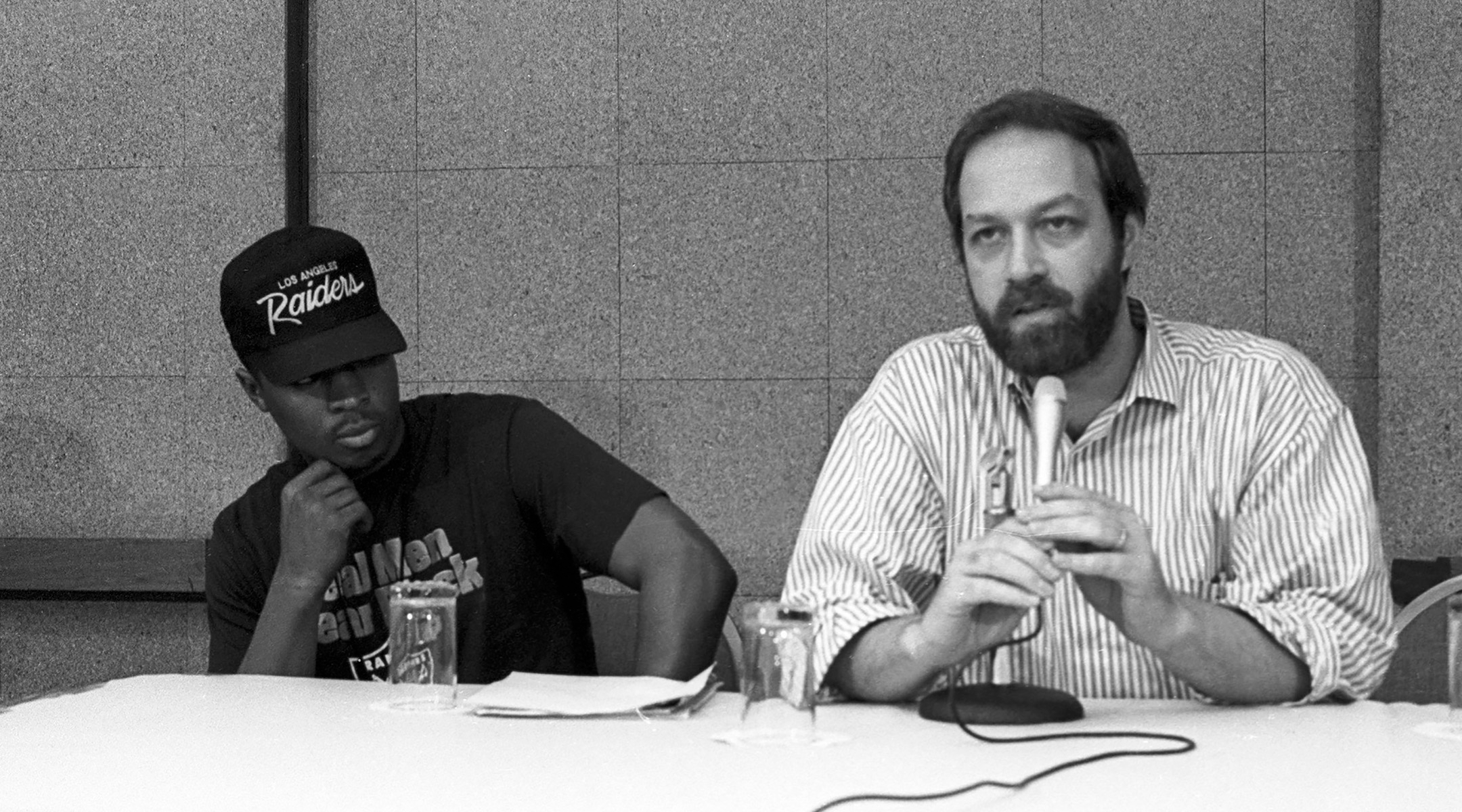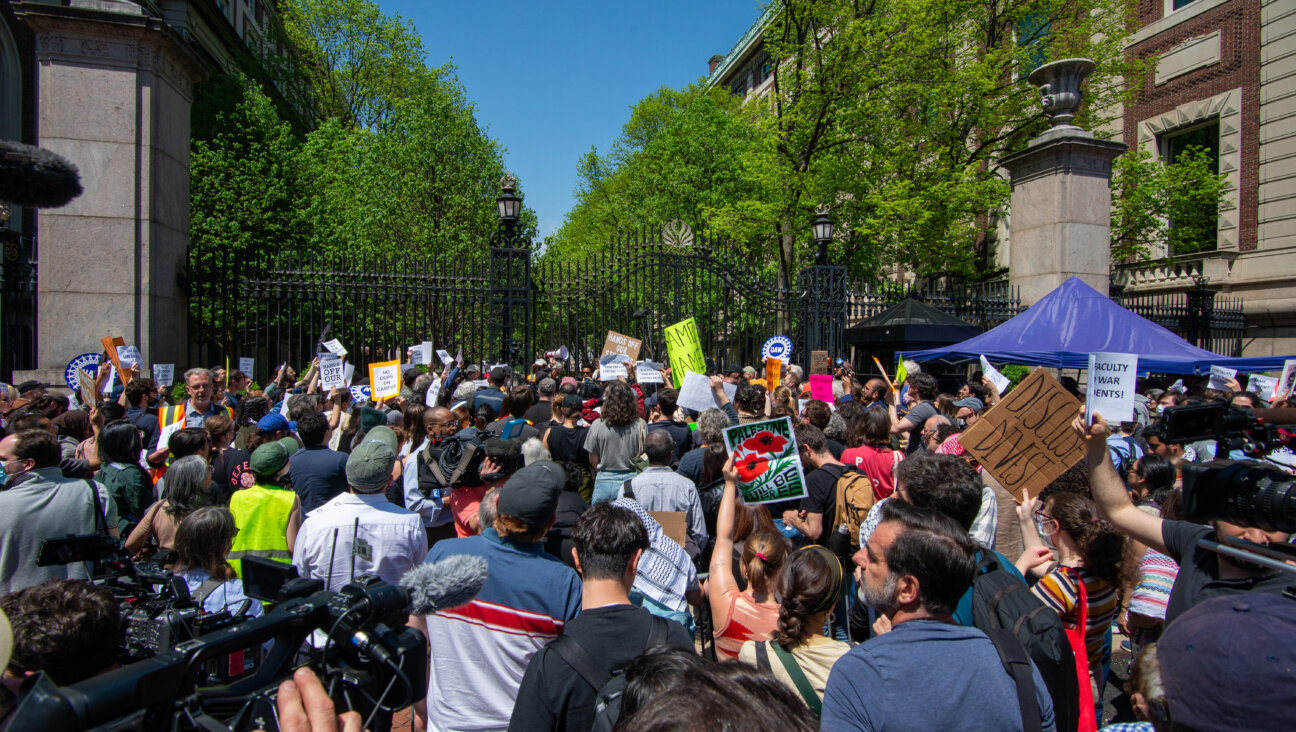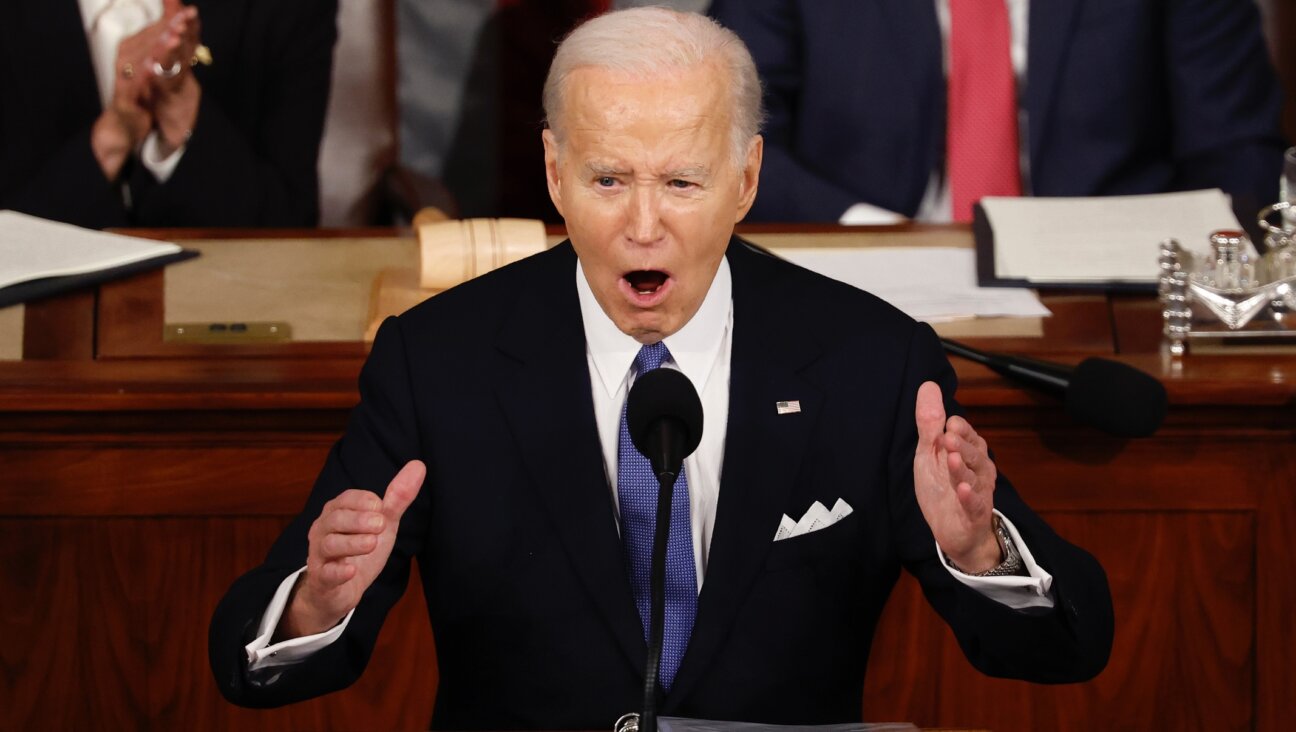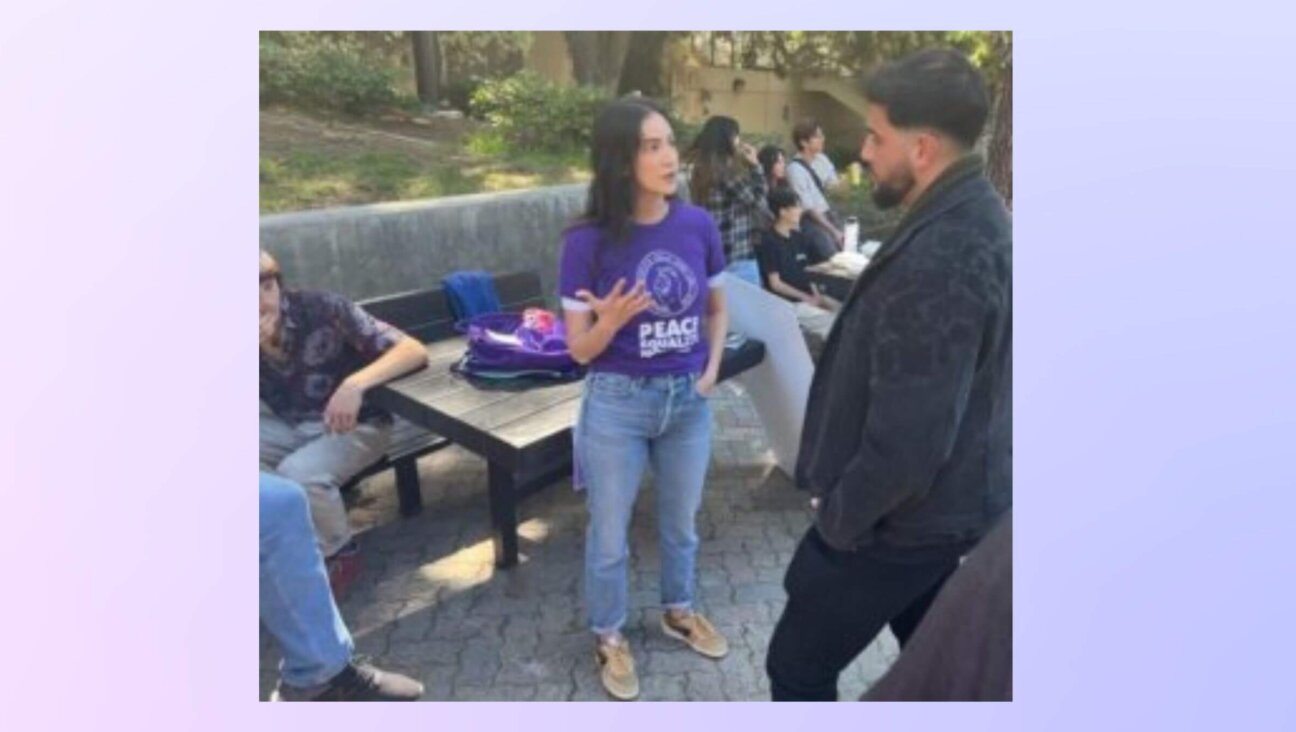From Rick Rubin to Doja Cat, Jews have helped shape the first 50 years of hip-hop

Clockwise from top left: The Beastie Boys, Doja Cat and Rick Rubin, shown with Russell Simmons, are a few of the prominent Jewish figures from the first 50 years of hip-hop. (Getty Images; Design by Mollie Suss)
(JTA) — Like many parents, Mickey and Linda Rubin indulged their only child Ricky’s various hobbies — magic, photography, music — while he was growing up in the 1970s on Long Island. Ultimately, they hoped he would set his artistic interests aside and choose the sensible career of an attorney.
Ricky famously stuck with music.
In 1983, when he was a junior at New York University, he borrowed $5,000 from his parents to record a song by a local rapper, T La Rock, and release it on his new label, Def Jam. The song, “It’s Yours,” was a hit and caught the attention of a businessman, Russell Simmons. The two would join forces and turn Def Jam into a hit factory. As a producer, Rick Rubin would go on to work with some of the most celebrated rappers of all time, including LL Cool J, Run-DMC, and Public Enemy.
“When I started Def Jam,” Rubin told the New York Times Magazine in 2007, “I was the only white guy in the hip-hop world.”
He certainly was not, but he was one of the only white Jews making rap records until Michael “Mike D” Diamond, Adam “MCA” Yauch, and Adam “Ad-Rock” Horovitz — better known as the Beastie Boys — burst onto the scene. Rubin produced and released the group’s 1986 debut album, “Licensed to Ill,” which became the first rap album to reach No. 1 on the Billboard 200 chart.
“If you want to talk about a singular Jewish contribution to hip-hop, it’d be Rick,” said Dan Charnas, a journalist and arts professor at Rubin’s alma mater, in an interview. “Instead of hip-hop being rapping over disco instrumentals, he conceived of it as sonic collage art.”
Fifty years ago, on Aug. 11, 1973, hip-hop was born (or so the origin story goes) when Jamaican Americans Cindy Campbell and her brother, a DJ who went by Kool Herc, hosted a back-to-school dance party in the recreation room of their Bronx apartment building. In its early years, rap was dismissed as street music by most music industry gatekeepers. It would take six years after that Bronx party for a rap record to get airplay on pop radio (Sugarhill Gang’s “Rapper’s Delight”).
Fast forward to 2023, and hip-hop is ubiquitous — not just on Spotify and TikTok, but across pop culture, from television to fashion.
Over the last five decades, many Jewish rappers from different backgrounds and nationalities have left their mark on hip-hop culture, from Drake to Doja Cat to Mac Miller to Nissim Black, to name just a few. In the early 2000s, religiously-observant artists such as Y-Love and Matisyahu carved out a niche for rap infused with Jewish wisdom and spirituality. Today, there are a number of rappers who make Judaism a prominent part of their stage personas, from Kosha Dillz to Lil Dicky to BLP Kosher; the latter dropped an album on Aug. 4 titled “Bars Mitzvah.” There is also a vibrant, multilingual hip-hop scene in Israel.
RELATED: The 10 most influential Jewish rappers of the past 50 years
But the biggest contributions that Jews have made collectively to hip-hop may have been on the business side, as managers and record label executives.
“White people have played more of a role on the business side than as artists because hip-hop is, for the most part, a Black art form,” explained Charnas, who worked in A&R (which involves seeking out new artists to sign) at Rubin’s American Recordings label in the early 1990s.
In his 2010 book “The Big Payback: The History of the Business of Hip-Hop,” Charnas shares the stories of the record label executives who commercialized hip-hop, including several Jewish ones: Roy and Jules Rifkind, owners of the label that released one of the first rap records in 1979, “King Tim III (Personality Jock)” by Fatback Band; Aaron Fuchs, founder of Tuff City Records, the first rap label to secure a major-label distribution deal; Tom Silverman, founder of Tommy Boy Records, whose roster of musicians included Queen Latifah, Coolio, De La Soul, and Naughty By Nature; Jerry Heller, co-founder of Ruthless Records with rapper Eazy-E; and Julie Greenwald, Def Jam’s head of marketing in the ’90s (who now runs the Atlantic Music Group).
Fuchs, who launched Tuff City in 1981, said by phone that he began working with hip-hop artists such as The Cold Crush Brothers at least a year before Rubin started Def Jam.
“I left my career as a writer and decided to run a record company on the belief that this Black music, like every other Black music in history, would be worth codifying,” he said. He later mentored Rubin and even produced some songs himself using the pseudonym Oliver Shalom, a play on the Hebrew honorific for the dead, “alav ha-shalom” (“peace be upon him”).
At 75, Fuchs still runs Tuff City and plans to release a four-part vinyl compilation of classic rap songs to which he owns the rights later this year. He described hip-hop as “a very, very, very important American expression.”
“I knew it would last, but I didn’t know that it would revolutionize music the world over,” he said.
In response to a direct message on Twitter, Chuck D of Public Enemy shared the names of the Jews he believes have made the biggest impact in hip-hop: Beastie Boys; MC Serch of interracial rap group 3rd Bass; Lyor Cohen, the son of Israeli immigrants who started as Run-DMC’s road manager and went on to run Def Jam after Rubin’s departure; and Bill Adler, Def Jam’s onetime director of publicity who helped Public Enemy weather an antisemitism controversy in 1989.

Def Jam Records publicist Bill Adler introduces Rapper Chuck D, left, of Public Enemy, as the latter prepares to fire bandmate Professor Griff for making antisemitic remarks, June 21, 1989. (Al Pereira/Getty Images/Michael Ochs Archives)
“What was interesting,” Chuck D wrote in a direct message, “was that everyone didn’t necessarily get along.” He described the 1980s rap scene as a “melting pot of personality, ego, pioneering, money, race, and everything else.”
Beyond the boardroom, Jews have also played a significant role in hip-hop as talent managers. Among the best-known are Heller (N.W.A.), Paul Rosenberg (Eminem, as well as Jewish rappers Action Bronson and The Alchemist), Leila Steinberg (Tupac Shakur, Earl Sweatshirt), and Todd Moscowitz (Gucci Mane).
Managers both inside and outside of hip-hop have long been vilified for profiting off of their artists’ creativity and labor, or worse. Some believe Heller stole from the members of N.W.A., but there is no evidence to support the claim. Steinberg’s story is different: She accepted very little money while working as Shakur’s first manager in Northern California because she did not want to be perceived as a white person taking undue credit for a Black person’s achievements.
“Back then, I really wanted to participate [in hip-hop] as an activist and couldn’t make sense of this being about money and business,” she said in an interview with the Jewish Telegraphic Agency earlier this year. “I’ve reshaped a lot of my thinking — if you’re not making money, you can’t make change in the world.”
In the realm of hip-hop media, two Israeli cousins — Menahem Golan and Yoram Globus — were responsible for producing the classic breakdance-themed musicals “Breakin’” and “Breakin’ 2: Electric Boogaloo” in 1984. Keith Naftaly was the program manager who turned Bay Area radio station KMEL into the best place to hear new rap music in the late ’80s (he is now the head of A&R at RCA). Peter Rosenberg’s voice can be heard every morning on one of the biggest rap stations in the country, New York’s Hot 97.
Many of the culture’s most enthusiastic chroniclers, it turns out, are members of the tribe: Jonathan Shecter and Dave Mays, who co-founded the groundbreaking hip-hop magazine The Source — the most popular music magazine in the United States in the late ’90s — as undergraduates at Harvard; DJ Vlad (born Vladimir Lyubovny), whose YouTube channel features interviews with numerous rappers and has 5.5 million subscribers; Nardwuar (John Ruskin), a Canadian journalist whose unpredictable interviews with rappers receive millions of views on YouTube; and ItsTheReal (Eric and Jeff Rosenthal), who recently released a deeply-researched podcast about the heyday of rap blogs. And then there’s Charnas himself, who is 55 and was one of the first writers at The Source and a founding father of hip-hop journalism. (The album that made him fall in love with hip-hop: Public Enemy’s “It Takes a Nation of Millions to Hold Us Back.”)
Charnas connects Jewish involvement in so many different aspects of hip-hop culture to the historical alliance between Jews and Black people.
“I think we were around because of our place in the American totem pole, and because of our cultural affinities,” he said. “We had geographical proximity to each other, so that has a lot to do with it. Obviously, Blacks and Jews were aligned politically.”
He added there has never been a “Jewish cabal” running the show — a charge that a small number of big-name rappers, including most recently Ye, formerly known as Kanye West — have made. In 2008, Jay-Z and Russell Simmons recorded a PSA about antisemitism geared toward hip-hop artists and fans that was produced by Rabbi Marc Schneier’s Foundation for Ethnic Understanding. Since then, Ice Cube, Nick Cannon, Jay Electronica, and, yes, even Jay-Z have all found themselves at the center of antisemitism controversies. (On a track on his 2017 album “4:44,” Jay-Z asked rhetorically, “You ever wonder why Jewish people own all the property in America?” He defended the lyric as an obvious exaggeration.)
“Jewish people have found important places and purchases in the business, but no more so than any other white folks,” Charnas said.
Y-Love, the trailblazing Black and Jewish rapper who is known for rhyming in Hebrew and Aramaic — and who, at age 45, calls himself “the OG of Jewish hip-hop,” meaning “the original gangster,” or the elder statesman — said the rappers who have been accused of antisemitism are not saying anything original. They are simply parroting ideas circulating in American society at large, he argued.
“There needs to be a moratorium on the phrase ‘Black antisemitism,” he said. “It’s the same antisemitism.” The best response to the hate, he said, is for Black Jewish rappers with huge fan bases such as Drake and Doja Cat to stand up and say publicly: “When you talk about Jews, you’re talking about me.”
One of the positive legacies of hip-hop, he noted, is that it has allowed Black Jewish rappers like himself to get on stages and screens and show the world just how diverse Jews are. “I think that through embracing hip-hop, the Jewish community added a lot to its own continuity,” he said.
Where is hip-hop headed in the next 50 years?
“As the barrier to entry to putting music out there gets lower, we are going to see more and more people putting tracks out that speak to them, and more managers that are willing to help them do it,” Y-Love said, adding, “Maybe one day we’ll see a Jewish hip-hop category at the Grammys.”
This article originally appeared on JTA.org.

I hope you appreciated this article. Before you go, I’d like to ask you to please support the Forward’s award-winning, nonprofit journalism during this critical time.
Now more than ever, American Jews need independent news they can trust, with reporting driven by truth, not ideology. We serve you, not any ideological agenda.
At a time when other newsrooms are closing or cutting back, the Forward has removed its paywall and invested additional resources to report on the ground from Israel and around the U.S. on the impact of the war, rising antisemitism and the protests on college campuses.
Readers like you make it all possible. Support our work by becoming a Forward Member and connect with our journalism and your community.
Make a gift of any size and become a Forward member today. You’ll support our mission to tell the American Jewish story fully and fairly.
— Rachel Fishman Feddersen, Publisher and CEO
Join our mission to tell the Jewish story fully and fairly.





















